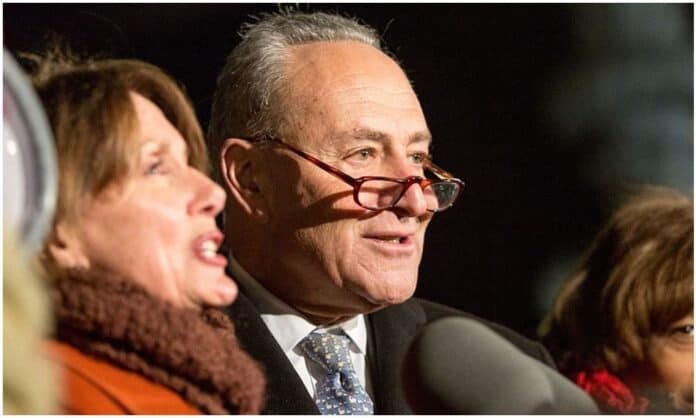Democrats argue the PRO Act will create safer workplaces and increase employee benefits by expanding union organizing. Those opposed to it argue it will force small businesses to close, cost an untold number of jobs and worsen the economy, and “impose a laundry list of other union boss power grabs.”
U.S. House and Senate Democrats have reintroduced the PRO ACT, a sweeping pro-union bill that would wipe out right-to-work labor laws in 27 states.
The bill, which includes sweeping changes to labor laws, is the “most significant worker empowerment legislation since the Great Depression,” unions claim.
A version of the bill was introduced in 2018 and 2019 and the Democratic-controlled House passed a version of the bill along partisan lines in 2019.
The bill would make it illegal to permanently replace striking workers, adopt California’s ABC Test to give union officials the power to force tens of thousands of independent contractors into unions, shut down Big Labor’s competitors by granting special powers that enable union bosses to drive merit-shop companies out of business, reinstate the Obama-era “persuader rule” that makes it more difficult for employees to hear both sides before getting the chance to vote on unionization, and the Obama-era “joint employer” standard which allows for increased litigation, among many other provisions.
Among its many provisions, the bill would advance union organization and collectively bargaining rights by authorizing the National Labor Relations Board to levy fines against employers who violate workers’ rights and unilaterally overturn a workplace election. It also would ensure that workers can participate in secondary boycotts and collect “fair share” fees.
“After Big Labor poured millions in forced-dues dollars into their campaigns last year, these politicians have put workers back in their sights at the behest of the union bosses that helped get them elected,” Mix added.
Mark Mix, president of the National Right To Work Committee, says instead of calling the bill the PRO Act, it should be called the “Pushbutton Unionism Bill” because “it will make forcing workers into an unwanted union as easy as pushing a button.
It took another 12 years for Congress to amend previous laws. After the Taft-Harley Act of 1947, states were given the ability to “opt out” of the NLRA’s forced-dues provisions by passing state right-to-work laws. There are currently 27 states with right-to-work laws. The PRO Act would reverse the changes of the right-to-work laws in these states.
In 1935, Congress gave Big Labor the power to force employees to accept their “exclusive representation,” and made it illegal for workers to represent themselves. Workers, regardless if they wanted union representation or not, were required to pay for it, even in cases where representation opposed their best interests.
Democrats disagree, arguing that “unions are critical to increasing wages and addressing growing income inequality.” They point to studies showing that union members earn on average 19 percent more than those with similar education, occupation, and experience in a non-union workplace.
Doing so would kill jobs and economic growth, the National Right To Work Committee argues. Its calculation of job growth in right-to-work states is double that of growth in forced-unionism states, and the average family living in a right-to-work state has $4,258 more to spend in after-tax real income.
But other groups like the International Franchise Association argue the bill will wipe out small businesses, including franchises.
“The PRO Act would reverse years of attacks on unions and restore fairness to the economy by strengthening the federal laws that protect workers’ right to join a union and bargain for higher wages and better benefits,” the sponsors of the bill argue.
Implementing an Obama era “joint employer” standard, IFA argues, “puts franchisors at risk of being sued for things they never did and had no power to stop. Faced with this reality, franchise companies are much less likely to partner with local entrepreneurs, lest they open themselves up to a slew of lawsuits.”
Franchising is an industry that empowers new entrepreneurs to operate under a national brand, allowing small businesses and national companies to grow faster and contribute more to local communities and the wider economy, IFA argues. The bill would seek to unionize franchises, thereby preventing national brands from partnering with small businesses.
The 2021 House bill was introduced by U.S. Rep. Andy Levin of Michigan, House Committee on Education and Labor Chairman Robert C. “Bobby” Scott of Virginia, Rep Frederica Wilso of Florida, Rep. Pramila Jayapal of Washington, and Rep. Brendan Boyle of Pennsylvania.
An NLRB 2015 joint employer rule action led to nearly double the amount of litigation against franchise businesses, IFA notes, costing them $33.3 billion per year. The Obama standard also prevented the creation of 376,000 new jobs in less than four years, IFA adds. The PRO Act would make this provision permanent, resulting in higher losses and lower job creation and small-business formation, the association argues.
The Senate bill was introduced by Senate Committee on Health, Education, Labor and Pensions Chair Patty Murray of Washington and Majority Leader Chuck Schumer of New York.
By Bethany Blankley | The Center Square
Go to Source
Reposted with permission





















![WATCH: Elon Musk Town Hall Rally in Green Bay [FULL Video]](https://www.wisconsinrightnow.com/wp-content/uploads/2022/04/Elon_Musk_3018710552-356x220.jpg)











